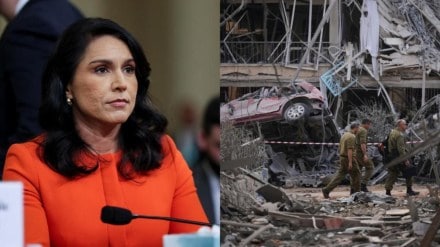A fresh wave of debates began after WikiLeaks resurfaced a testimony by US National Intelligence Director Tulsi Gabbard, in which she stated that Iran was not building nuclear weapons, just weeks before Israel launched a full-scale air offensive on the country. The development has raised serious questions about the rationale behind Israel’s strikes and the role of the United States, Israel’s principal ally in the escalating conflict.
Israel began long-anticipated attacks on Iran on Friday, with Prime Minister Benjamin Netanyahu declaring the operations would continue “as long as necessary”. The strikes came soon after the International Atomic Energy Agency (IAEA) passed its first resolution in two decades labelling Iran non-compliant with nuclear non-proliferation norms, citing alleged “secret nuclear activities”.
Netanyahu claimed the strikes were “pre-emptive”, warning that Iran had taken steps to weaponise enriched uranium and could build a nuclear bomb “within months”. Israel deployed 200 aircraft to hit over 100 sites, including strategic energy infrastructure and military installations. Satellite imagery reviewed by The New York Times showed widespread destruction across Iranian facilities.
WikiLeaks shares Gabbard’s testimony video
In a post on X, WikiLeaks shared Gabbard’s March 25 testimony to the US Senate Intelligence Committee. “The intelligence community continues to assess that Iran is not building a nuclear weapon,” Gabbard stated, adding that Supreme Leader Ayatollah Ali Khamenei had not re-authorised the program he suspended in 2003. “The IC is monitoring if Tehran decides to reauthorise,” she can be seen saying in the video of the testimony.
US intelligence assessed just weeks ago that Iran is not building a nuclear weapon
— WikiLeaks (@wikileaks) June 14, 2025
“The IC [Intelligence Community] continues to assess that Iran is not building a nuclear weapon and Supreme Leader Khamanei has not authorized the nuclear weapons program he suspended in 2003.… pic.twitter.com/jtNw3d3xgR
Gabbard’s remarks, now resurfacing as Israel intensifies its offensive, have cast doubt over the legitimacy of the IAEA’s findings and the geopolitical motivations behind the strikes. A report by Al-Jazeera suggested that the timing of the attack, amid ongoing US-Iran nuclear negotiations, may indicate a strategic effort by Washington and Tel Aviv to pressure Tehran.
‘Israel has crossed every red line’
In a letter to the UN Security Council, Iranian Foreign Minister Abbas Araghchi condemned Israel’s strikes, stating that Tel Aviv had “crossed every red line” and warning that it would “deeply regret this reckless aggression”.
However, the developments so far have cast doubt on the strength of Iran’s military posture. Israel’s offensive has exposed significant vulnerabilities in Iran’s defence and retaliation capabilities. Although Iran responded by launching over 100 drones toward Israeli territory on Friday, no casualties or substantial damage have been reported.
